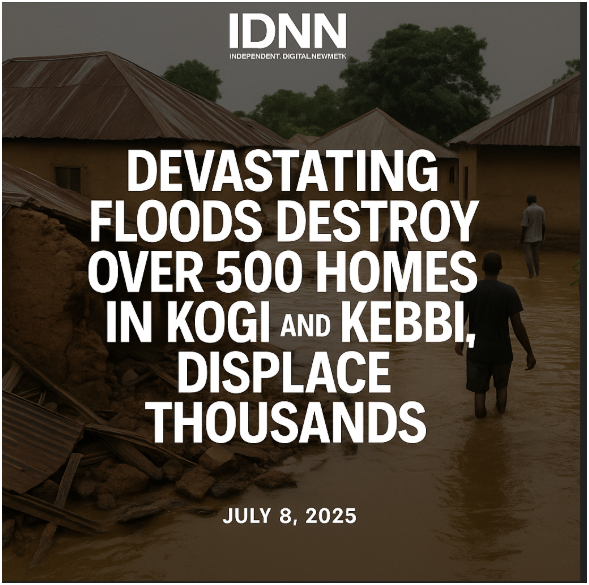kOGI & KEBBI STATES — July 8, 2025 | IDNN NATIONAL AFFAIRS DESK —
A wave of destructive floods and rainstorms has swept through rural communities in Kogi and Kebbi states, destroying over 500 homes and displacing hundreds of families in one of Nigeria’s most severe climate-related disasters of 2025.
Triggered by days of intense rainfall, the flooding submerged entire neighbourhoods in Kabba, the headquarters of Kogi’s Kabba/Bunu Local Government Area, while a devastating storm in Kebbi’s Bunza and Arewa LGAs left dozens of homes flattened.
Officials say the disaster has created a humanitarian emergency, with livestock lost, farmlands destroyed, and affected families now seeking refuge in schools, mosques, and public buildings.
“This is a humanitarian crisis. The dignity, safety, and survival of our people are now at stake,” said Mathew Kolawole, former Speaker of the Kogi State House of Assembly.
Kabba Devastation: Streams Overflow, Homes Submerged
In Kogi, residents described how continuous rain between Wednesday and Saturday caused streams and brooks to overflow, engulfing multiple settlements. Idde-Iyah community within Kabba town was among the hardest hit, with residents saying the floodwater surged without warning.
Eyewitnesses reported watching entire homes collapse, roads cut off, and livestock swept away.
“We lost everything—roof, clothes, even our goats. We didn’t expect water to reach this high,” said Dorcas Aina, a mother of three.
Though the Kogi State Emergency Management Agency (SEMA) confirmed awareness of the incident, a full assessment report was still pending at press time.

Kebbi Storm: Villages Shattered, Injuries Reported
In Kebbi, a fierce rainstorm lasting over three hours hit Zogirma village in Bunza LGA, flattening over 60 homes and damaging more in nearby communities across Arewa LGA—including Tungar Chindo, Tungar Kure, Feske Malabawa, and Feske Rafi.
Residents say winds tore through their villages, collapsing structures and injuring several people.
“It felt like the sky was falling. We couldn’t run fast enough,” said Abubakar Usman, a survivor.
Some victims have been relocated to temporary shelters while awaiting government assistance. The Secretary of Bunza LGA, Malam Muhammed Umar Mawo, assured victims that an official report would be submitted to the state government for relief intervention.
Climate Warnings, Systemic Vulnerabilities
This latest climate disaster adds to the growing tally of rural communities facing severe weather shocks. Experts warn that urban planning, poor drainage, and deforestation have made Nigeria especially vulnerable to climate-driven disasters.
The Nigerian Meteorological Agency (NiMet) had earlier issued warnings about widespread thunderstorms and rainfall between July 7–9 across northern and central Nigeria.
Call for Proactive Measures
While no fatalities were reported as of press time, humanitarian agencies are calling for swift relief action, improved flood control systems, and proactive relocation plans for high-risk zones.
“These recurring floods are no longer random. They’re now a pattern,” said environmental policy analyst, Halima Jibrin. “Government must respond with urgency and foresight.”
🧨 This is IDNN. Independent. Digital. Uncompromising.
